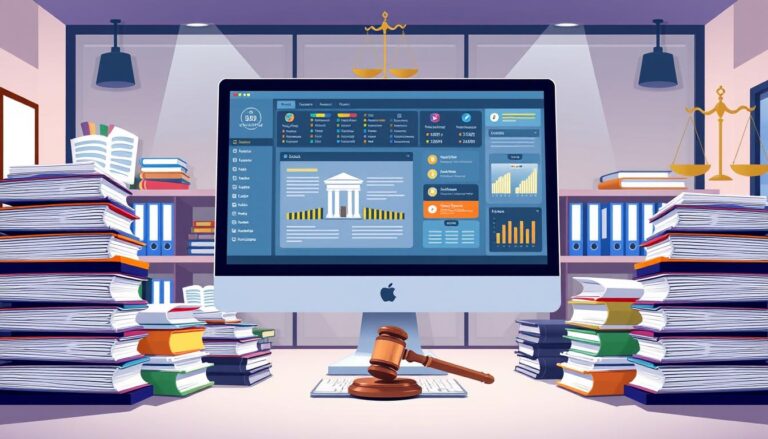Using AI for Enhanced Legal Research
In the fast-changing world of law, a big question is: How can artificial intelligence (AI) change how lawyers do research and find key insights? The answer is in AI’s power to transform legal research, making a big difference for lawyers everywhere.
Lawyers see AI as a big help, with 65% thinking it’s best for research tasks. AI can do things like review evidence and start legal documents. Also, 56% think AI will help with document drafting, and 44% with analysis.
AI uses advanced analytics and natural language to change legal research. It can quickly look through many cases and find connections. This lets lawyers focus on strategy and analysis, leaving the hard work to AI.
Understanding the Evolution of Legal Research Technology
The legal world has changed a lot over time. We no longer just search through books in law libraries. Now, AI tools have changed how lawyers do their jobs.
Traditional Legal Research Methods vs Modern Approaches
Before, lawyers spent hours searching through books and case law. Now, AI tools use digital databases and algorithms to make research faster. These tools can handle more data, give quicker answers, and cut down on mistakes.
The Rise of AI in Legal Practice
AI is becoming more common in law. Tools like ROSS Intelligence have been used by BakerHostetler since 2016. They save a lot of time and make work more efficient.
Current Challenges in Legal Research
Even with new tech, legal research still has its hurdles. There’s a lot of legal info, complex language, and manual research is hard. AI tries to solve these problems by automating tasks, improving accuracy, and saving time.
As law evolves, using AI in research is key. It makes research faster, more accurate, and less prone to mistakes. This could change how lawyers find and use information, making legal work more efficient.
Using AI for Enhanced Legal Research: Key Components and Features
The legal world has changed a lot with the help of artificial intelligence (AI). AI makes legal research better by understanding complex legal terms and finding patterns in documents.
At the heart of this change are a few key parts. There are lots of legal data sources like case law and court documents. These are then sorted and analyzed using advanced technology.
This technology has made legal research faster and more accurate. AI-driven legal research is much better than old ways of doing it. Lawyers can now find important legal information quickly and easily.
Also, AI research tools keep up with new legal data. This means lawyers always have the latest information. The technology can understand legal language very well, giving results that are just right for each case.
“AI is revolutionizing the way legal professionals approach research, transforming it from a time-consuming, error-prone task into a streamlined, data-driven process.”
AI is making legal research better in many ways. Lawyers save time, make fewer mistakes, and learn more. The future of legal research looks very promising with AI leading the way.
Natural Language Processing in Legal Document Analysis
Natural Language Processing (NLP) is changing how lawyers work with documents. It lets AI systems understand and decode complex legal language. This makes legal information extraction and intelligent legal assistance better than ever.
How NLP Transforms Legal Text Understanding
NLP systems can pull out important details from legal papers with great accuracy. They find things like who’s involved, when, and what laws apply. This helps lawyers quickly get through huge amounts of legal texts, like contracts and court cases.
Advanced Search Capabilities and Context Recognition
NLP makes it easy to search through huge databases of legal texts. It understands the context of what you’re looking for. This means search results are more relevant and useful.
Automated Document Classification Systems
NLP helps sort and organize legal documents automatically. This makes finding what you need much easier. It groups documents based on their content, saving time and effort.
NLP is changing how legal teams handle document-heavy tasks. It automates boring work and gives precise, relevant insights. This boosts efficiency, accuracy, and productivity in the legal field.
“NLP-powered systems can automatically extract key information from legal documents with a high degree of accuracy, such as parties’ names, dates, and legal provisions.”
Machine Learning Algorithms in Case Law Analysis
Machine learning algorithms are changing how lawyers study case law. These tools learn from big datasets and get better over time. They find complex patterns and insights that old ways can miss.
Using legal data mining and predictive analytics, these algorithms spot trends in case law. They help predict case outcomes. This gives lawyers data to make smarter, more informed decisions.
- Enhanced Pattern Detection: Machine learning models find subtle patterns in legal documents. They reveal insights humans might miss.
- Predictive Analytics: These algorithms use past data to forecast case outcomes. They give lawyers a head start in planning strategies.
- Automated Document Analysis: Machine learning tools quickly analyze legal documents. This saves time for lawyers to focus on more important tasks.
“AI and machine learning technologies have the potential to transform the legal industry by automating time-consuming research tasks and providing valuable insights that can inform strategic decision-making.”
Using machine learning in legal research is promising but raises ethical and regulatory questions. It’s important to ensure these technologies are used responsibly and effectively.
As the legal world changes, using machine learning in case law analysis will become key. Law firms and lawyers will need to use these technologies to stay competitive. This will help them improve their research, decision-making, and client service.
AI-Powered Legal Research Platforms and Tools
The legal field has seen a big change with AI tools. These tools make legal research faster and more accurate. They help lawyers find their way through complex legal information.
Leading Legal Research Software Solutions
Tools like Lexis+ AI, Westlaw Precision, and Bloomberg Law give detailed results. They work well with what lawyers already use. Their interfaces are easy to use, making research simpler.
- Paxton AI’s search engine understands simple language, finding legal info fast.
- Westlaw Precision’s AI saves time by giving clear answers with reliable sources.
- Bloomberg Law uses AI to find important legal documents, with tools like Smart Code.
New tools like Casetext CoCounsel and Gideon make legal research better. CoCounsel uses GPT-4 to answer questions with detailed answers. Gideon helps with client intake and document work, making research easier.
These tools offer many features. They help with legal data, predicting outcomes, and more. They aim to make legal work better, faster, and more accurate.
Integration Capabilities with Existing Systems
One big plus of these tools is how well they work with what lawyers already use. This makes it easy for them to use these advanced tools in their daily work.
User Interface and Accessibility Features
The interfaces of these tools are designed to be easy to use. They make it simple for lawyers to find what they need fast. Features like conversational search and legal drafting help lawyers work better.
Enhancing Research Efficiency Through AI Automation
Legal research is key in the legal field but can be slow and hard work. But, legal research automation and AI-enhanced legal research are changing how lawyers do this important job.
Studies show AI tools make legal research much faster. The National Legal Research Group found AI helps legal experts work 24.5% quicker. This could save lawyers up to 210 hours a year.
- 58% of legal professionals are using AI tools for drafting/templating communications.
- 53% of legal practitioners employ AI for conducting legal research.
- 42% of legal professionals utilize AI tools for summarizing legal narratives.
AI’s strength is in quickly sorting through legal documents and finding important cases. This lets lawyers spend more time on important tasks like planning and talking to clients.
| AI-Powered Legal Research | Traditional Legal Research |
|---|---|
| Automated document analysis and categorization | Manual review and organization of legal documents |
| Rapid identification of relevant case law and precedents | Time-consuming search and retrieval of case law |
| Extraction of key information and insights | Reliance on human expertise to synthesize information |
| Increased efficiency and productivity | Potential for inconsistencies and human error |
By using legal research automation and AI-enhanced legal research, lawyers can make their work faster and better. This helps them serve their clients better too.
Data Security and Ethics in AI Legal Research
The legal world is moving fast towards AI tools for research. But, data security and ethics are key. Lawyers must protect secrets, keep privacy, and follow rules when using AI.
Confidentiality and Privacy Considerations
Legal data is very sensitive. Lawyers must keep it safe. They need strong encryption, access controls, and watch for data breaches.
They also need to know about AI’s bias risks. This is because AI can carry old biases in its data.
Ethical Guidelines for AI Implementation
The legal field is still figuring out AI ethics. But, lawyers must know about AI. The American Bar Association says they should understand AI’s good and bad sides.
Before using AI, lawyers should talk to clients. They need to get their okay to use AI in their work.
Compliance with Legal Standards
Lawyers must follow the law when using AI. They need to make sure AI info is right. And, they should add their own thoughts to keep legal work solid.
They also have to watch out for AI plagiarism. All their work must meet legal and ethical rules.
By focusing on security and ethics, lawyers can use AI well. They can keep client secrets safe and follow the law.
| Considerations | Key Ethical Principles |
|---|---|
| Confidentiality and Privacy | Robust data encryption, access controls, and monitoring mechanisms to prevent unauthorized access or data breaches. |
| Ethical Guidelines for AI Implementation | Lawyers must maintain competence in current technologies, understand AI’s capabilities and limitations, and obtain informed consent from clients before using AI in legal services. |
| Compliance with Legal Standards | Ensuring accuracy of AI-generated information, supplementing AI results with human analysis, and avoiding plagiarism risks associated with AI-generated content. |
“Lawyers must be informed and up to date on current technology, including AI tools, to maintain competence and provide competent representation.”
Benefits and ROI of AI-Enhanced Legal Research
The legal world is changing fast with Artificial Intelligence (AI). AI in legal research brings many advantages. It makes work more efficient, accurate, and cheaper. Lawyers can now make better strategies by understanding judges, courts, and damages better.
AI helps lawyers talk better with clients and do better research. It also lowers the chance of missing important details. The benefits are clear: more time saved, better legal work, and happier clients.
- 56% of large law firms believe AI will become mainstream in the practice of law within the next five years.
- 64% of law firms using AI-enhanced technologies deploy them for legal research.
- 77% of law firms using AI cite ‘increasing efficiency’ and ‘saving time’ as top benefits.
- 47% of law firms using AI are using AI-driven document review to catch errors that legal professionals might miss manually.
The benefits of AI in legal research efficiency are real and can be measured. Firms can see the value of AI by looking at the benefits it brings. These include saving money, working better, and making clients happier.
Law firms can use AI to improve their work. They can find the right AI tools, try them out, and make their research and decisions better.
“AI can automate up to 22% of a lawyer’s current workload.”
As AI becomes more common in law, its benefits will grow. Firms that use AI wisely will stand out. They will offer better legal services and succeed in the long run.
Best Practices for Implementing AI in Legal Research
Legal professionals are looking into AI for research benefits. It’s important to pick the right AI tools for legal work. These tools should fit well with current workflows and meet data security needs.
Also, check if AI results are accurate by comparing them with trusted legal sources and experts. AI can handle lots of data fast. But, it’s crucial to add human insight to avoid mistakes.
Learning and adapting are essential for AI in legal research. Stay updated on AI tech, train your team, and encourage innovation. By doing this, law firms can make research better, more accurate, and help clients more.
Source Links
- AI for Legal Research – Bloomberg Law
- How Generative AI Can Enhance Legal Research Responsibly
- Discover how artificial intelligence is transforming legal research
- The Power of AI in Legal Research | LexisNexis
- AI for legal research: Applications, benefits, tools and development
- The Power of AI in Legal Research | LexisNexis
- Legal NLP
- Natural Language Processing in Legal Document Analysis
- AI Legal Document Analysis: Uncover Important Insights
- How AI and Machine Learning Improve Legal Research for Law Firms
- Leverage AI Legal Research Tools for Your Small Practice
- AI for Legal Research: Use Cases, Benefits, Challenges & More
- Top 10 AI Legal Research Tools 2024
- AI Tools for Lawyers: Legal AI Solutions for Law Firms
- AI Tools for Lawyers: A Practical Guide | Bloomberg Law
- Top Blog on Business, Economics and Finance – Experts Views
- Leveraging Artificial Intelligence for Enhanced Efficiency in Legal Departments | LEGAL SUITE
- How Generative AI Can Enhance Legal Research Responsibly
- Legal Ethics in the Use of Artificial Intelligence (January 2019)
- Emerging Challenges with Law Firms Using AI for Legal Research
- The business case for AI-enabled legal technology
- How Can Law Firms Assess ROAI (Return on AI)
- AI for Lawyers: Transform Your Legal Practice with AI Tools
- Enhancing Legal Research with AI: Best Practices and Future Trends
- Legal research with AI: 5 Essential Steps for Success 2024







